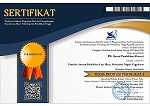Gambaran attitude guru pada pendidikan inklusi : a literature review
Downloads
Abstrak: Kepercayaan umum bahwa efektifitas inklusi tergantung pada peran guru. Guru merupakan agen utama untuk menciptakan lebih sedikit lingkungan terbatas di ruang kelas. Sikap dan harapan positif guru sangat penting untuk keberhasilan inklusi dan hasil belajar siswa. Seorang guru diharapkan dapat memberikan kehidupan kelas agar menjadi lebih hangat dan pada waktu yang bersamaan dapat memberikan pemahaman kepada murid yang lain untuk dapat saling berinteraksi. Guru dengan sikap positif terhadap inklusi cenderung lebih siap untuk menyesuaikannya pendekatan untuk memberikan manfaat bagi semua pelajar dengan berbagai kebutuhan belajar. Penelitian ini bertujuan untuk melakukan tinjauan literature tentang gambaran sikap guru pada pendidikan sekolah inklusi. Pencarian literatur dilakukan dalam rentang 10 tahun tentang gambaran sikap guru terhadap pendidikan inklusi. Database elektronik yang digunakan adalah Springer, Sage, ProQuest, dan Portal Garuda. Studi ini menyimpulkan bahwa sikap guru terhadap pendidikan inklusi yang muncul berupa sikap positif yaitu sikap menerima terhadap pendidikan inklusi dan sikap negatif yaitu sikap menolak terhadap pendidikan inklusi. Faktor yang mempengaruhi sikap guru terhadap pendidikan inklusif, yaitu latar belakang dan tingkat pendidikan, efikasi diri, pengalaman belajar dan pelatihan.
Downloads
Arnold, J., & Randall, R. (2010). Work psychology: understanding human behaviour in the Behavioral Sciences, 33 (0), 900-904.
Berry, R. A. W. (2006). Inclusion, Power, and Communi t y: Teacher and Students Interpret The Language of Community in an Inclusion Classroom. American Educational Research Journal, 43 (3), 489-529.
Combs, S., Elliott, S., & Whipple, K. (2010). Elementary Physical Education Teachers'Attitudes towards the Inclusion of Children with Special Needs: A QualitativeInvestigation. International Journal of Special Education, 25 (1), 114-125.
de Boer, A., Pijl, S. J., & Minnaert, A. (2010). Regular primary schoolteachers' attitudes towards inclusive education: a review of the literature. International Journal of Inclusive Education, 15 (3), 331-353.
Forbes, F. (2007). Towards inclusion: an Australian perspective. Support for Learning, 22 (2), 66-71.
Galovic, D., Brojcin, B., & Glumbic, N. (2014). The attitudes of teachers towards inclusive education in Vojvodina. International Journal of Inclusive Education, 18 (12), 1262-1282.
Hofman, R. H., & Kilimo, J. S. (2014). Teachers' Attitudes and Self-Efficacy Towards Inclusion of Pupils With Disabilities in Tanzanian Schools. Journal of Education and Training, 1 (2), 177- 198.
Hwang Y-S, Evans D. (2011). Attitudes towards inclusion: gaps between belief and practice. International journal of special education. 26 (1), 136-46.
Leatherman, J. M., and Niemeyer, J. A. (2005). Teachers' Attitudes Toward Inclusion: Factors Influencing Classroom Practice. Journal of Early Childhood Teacher Education, 26 (1), 23-36.
Loreman, T., Sharma, U., & Forlin, C. (2013). Do Pre-Service Teacher Feel Ready to Teach.
MacFarlane, K., & Woolfson, L. M. (2013). Teacher attitudes and behavior toward theinclusion of children with social, emotional and behavioral difficulties in mainstream schools: An application of the theory of planned behavior. Teaching and Teacher Education, 29 (0), 46-52.
Malinen, O. P. (2013). Inclusive education from teachers' perspective. Examining pre- and in-service teachers' selfefficacy ad attitudes in mainland China. Desertasi Doktor pada University Of Eastern Finland.of serbian Teachers' Attitudes Toward Inclusive Education. The Journal of Special Education and Rehabilitation, 14(3/4), 78-97. practice. International Journal of Special Education, 26 (1), 136-146.
Muzdalifah, F., & Husna Zadat, B. (2017). Pengaruh Efikasi Pada Sikap Guru Terhadap Pendidikan Inklusif. Jurnal Penelitian dan Pengukuran Psikologi. 6 (1), 26-34.
Rajovic, V., & Jovanovic, O. (2013). The Barriers to Inclusive Education: Mapping 10 Years.
Rumalutur, N, A., & Farida Kurniawati. (2018). The Attitudes of In-Service and Pre Service Teachers Toward Inclusive Education. Advances in Social Science, Education and Humanities Research. 229. 620-630.
Subban, P., & Sharma, U. (2006). Primary school teachers' perceptions of inclusive education in Victoria, Australia. International Journal of Special Education, 21(1),42-52.
Taylor, R. W. and Ringlaben, R. P. (2012). Impacting Pre-service Teachers' Attitudes toward Inclusion. Higher Education Studies, 2 ( 3).
Triwulandari, A., & Weny,S,S, P. (2015). Sikap Guru Terhadap Penerapan Program Inklusif Ditinjau dari Aspek Guru. Jurnal Pendidikan dan Pemberdayaan Masyarakat. 2 (2), 122-130.
Undang-Undang Republik Indonesia No.20 tahun 2003 tentang Sistem Pendidikan Nasional. (n.d.). Bersumber dari http://pendis. kemenag.go.id/file/dokumen/uuno20th2003ttgsisdiknas.pdf. Diakses pada tanggal 26 Oktober 2020.
Unianu, E. M. (2012). Teachers' attitudes towards inclusive education. Procedia - Social and workplace (5 Ed.). Harlow: Financial Times Prentice Hall.















